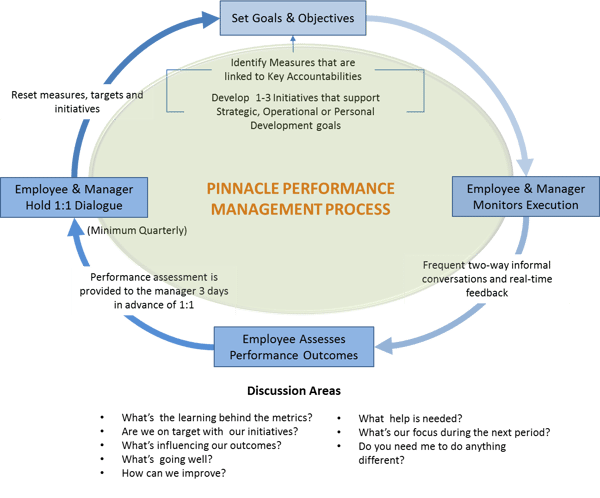The term “Performance Review” or “Appraisal” can send a feeling of dread and apprehension through your employees. So how can you make this valuable time with your employees more positive? And how can you prepare for an effective performance review?
1. Maintain a systems view
Organizations are complex systems comprising of a network of interdependent components that work together to accomplish a common goal. In every system there are internal and external forces that impact performance which are outside a person’s ability to control. Meaningful performance conversations identify the driving forces that influence results and the actions needed to achieve their planned outcomes. Performance barriers are external or internal environmental factors which get in they way of accomplishing business needs. An example of these can be seen below (1):
| External Environmental Factors | Internal Environmental Factors |
|
|
By identifying the factors impacting systems, performance reviews can be far more systems focused. This also allows for more meaningful initiatives to be agreed upon and worked on to influence performance for the next review period.
2. Maintain a growth mindset
The most effective performance management systems create a “growth mindset.” People with a “growth mindset” are resilient, they embrace challenges, they are willing to stretch, and they view failure as an opportunity for learning and growth. Performance reviews that are conducted with a growth mindset…
- Focus on the future – not the past
- Use performance measures as a springboard for conversation that leads to discovery
- Promote frequent two-way dialogue
- Recognize that people are not a rating
- Avoid creating competition among team members
Therefore, when conducting an effective performance review, it is vital that specific, tangible measures are the point of focused to drive conversation and allow employees to self-evaluate progress outside of the review arena.
3. Allow time for personal reflection
A critical piece that is often forgotten prior to performance reviews even taking place is to place value on time for you and your employee to reflect personally on the review period. By providing metrics before the review, both of you can reflect on the driving forces for the results on a personal level before discussing as a team. The most effective cycle for performance reviews that we have seen is shown below. By allowing for this time discussions can be far more productive and meaningful leading to a more effective performance review in general.

While there are many ways of conducting an effective performance review, in numerous formats, the 3 influential factors discussed above can really change the dynamics of any review period. So remember how ever you conduct your reviews keep in mind time for reflection prior to meeting, remain future focused in your discussions and use metrics to identify barriers of performance to support the creation of meaningful initiatives.
(1) Adapted from The Society of Human Resource Management. The SHRM Learning System. Virginia: The Society of Human Resource Management, 1999. (https://www.shrm.org/)
%20Full%20Color.png?width=250&name=Aliniti%20plus%20Tagline%20(Registered)%20Full%20Color.png)